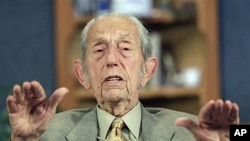A silver-haired gentlemen has just stepped out of the National Air and Space Museum in Washington. With its collection of pioneering airplanes, telescopes and rockets, the museum is a temple to the triumph of science.
Billy Johnson said that's all fine and good, but he puts scripture above science. The gentleman from Mississippi, which recently has been hit by floods and tornadoes, believes what the Bible calls 'the end times' could begin at any moment.
He said that when it does, "the believers in Christ are going to be called up, and they'll go to heaven to be with Christ. Then," he adds, "oh, it gets complicated - then you've got a thousand-year reign, Satan will be turned loose."
Johnson is describing what is known as the Rapture - an apocalyptic scenario that experts say a fifth of American Christians believe.
Many people have been mocking followers of U.S. radio preacher Harold Camping, who wrongly predicted that the Rapture would occur on May 21.
Johnson is not a Camping follower, but he is one of many Americans who believe the Rapture could occur at any moment. And experts say such beliefs are fueled by the current mix of natural disasters and economic insecurity.
Historians say there have always been people who thought they were living in the end times. But surveys suggest that apocalyptic sentiment is strong in America today.
According to a March poll by the Public Religion Research Institute, 44 percent of respondents said the severity of recent natural disasters is evidence the end times are happening now.
Richard Fenn, a professor of Christianity at Princeton Theological Seminary, said such beliefs are rooted in the American middle and lower classes' economic insecurity and sense of institutional failure.
"Schools don't educate, hospitals don't heal, insurance companies don't insure, pensions don't materialize, banks don't lend money." And that, he says, contributes to "this whole sense that something is out of whack, fundamentally not working."
He said there's also something else going on.
"I think you have to take into account that America has a safety net that is far thinner, far weaker, has more holes in it, than comparably industrialized nations, say, in Western Europe," said Fenn, suggesting that the prospect of facing a job loss or health catastrophe without support can intensify existential fears.
Fenn has written a book called Dreams of Glory, in which he blames the apocalyptic thinking in monotheistic faiths in part for global terrorism. He accuses the Christian fundamentalists of having a Manichean view of the world. He added that they are trying to foment conflict in the Middle East in the hope it will be Armaggedon, an end times battle prophesied in the New Testament.
"There is in the Christian right a real belief that in the end there are only two kinds of people. And the others, whoever they are - homosexuals, ACLU, Muslims, feminists - they're going to go down," he said.
But another school of thought sees apocalyptic belief as having a mostly benevolent effect, helping people cope with their immediate problems.
"People have financial panic, they have political turmoil, they have uncertainty in their personal lives and you can use a negative word here but this is kind of an escape theology," says Doug Weaver, a professor of religion at Baylor University in Waco, Texas. "You can escape all the problems of the past because Jesus will come back and take you out of it."
And, he argues it can even encourage moral behavior. Many believers say the possibility of an imminent end to it all makes them focus on what's important. They say they try to live every day as righteously as possible, in the hope that when it does happen, they will be among those saved.
Belief in End Times in America Attributed to Economy, Natural Disasters




